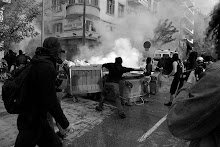Social control, entrism
The present debate on the problem of ‘social control’ is nearly always based on a misunderstanding, often nourished by a scarse capacity to go into both positions.
Given as certain that the problem of ‘control’ only becomes central for the State and capital as the primary condition for getting ‘consensus’, I don’t see why control should be interpreted – as some do – only in terms of technical capacity.
There is no doubt about that fact that the State possesses apparatus that was once undreamed of and that this can control more easily. But there is also no doubt that the State, on its own, is an abstraction. We think of it as being composed of men, who, no matter how much apparatus they possess, are still men and will always have defects and limitations.
If we look at things from this angle one will not reach the strange conclusion odf ‘the end of the era of secrets’.
But what secrets?
Whenever did the anarchist movement choose the road of clandestinity of its own accord? But, per un altro verso, whatever does it mean that in the face of the present control of the State we must do everything in the light of day?
There are things that should be done in the light of day, such as for example propaganda, the development of the movement as a whole, counterinformation, social struggles, etc. but there are some things that require caution, that not everyone has to know about. That in no way contradicts the principles of anarchism. In fact, anarchy has never been synonymous with naivety, or worse still, stupidity. There are struggles that power must not know about except when the result has been obtained. And the objection that, at the present time, the level of control makes these struggles impossible, because this objection could, at most, have the value of a call to greater care, a greater sense of self criticism, etc., beyond this, if one were to insist too much, everything would end up in an empty and generic invitation to desist.
Comrades are all highly responsible people. They know very well what a struggle means and what a struggle with different characteristics means. In involving themselves in one or the other they know perfectly well the level of danger they are facing and therefore choose the means that they consider best.
Any analysis that shows modern means of control is certainly useful because comrades can draw useful lessons for being more careful in their work. But when this investigation crosses their own field, ie, that of documentation, and threatens to become horatory, didactic, pedagogic, then it turns out to be no different to that of a simple and direct invitation to lay down arms and stop struggling, to desist.
Entrism
Let me turn a moment to the enormity of what was said a short time ago, that of going into institutions to make them more democratic. It would be pointless to talk about it if it were not that the problem has been raised, so let’s face it.
What do people want to do? Go into the police to make the police more democratic? Or even the army; what do they want?another anarchist general also today? But let’s not talk rubbish. Let’s stop going to such extremes, which were perhaps only a joke. Let’s assume that that’s not what they meant, but let’s take another structure, school for example. Is is right for anarchists to go into schools, and so, transforming school from the inside can lead it to the ideal of a libertarian pedagogy? Let’s say that was the idea, leaving the police alone. It is the classic concept of entrism, diffused from Trotsky onwards. In fact the originator iof this concept is precisely Trotsky. This hypothesis does not take into account the essential fact that man does not decide by himself but it is also the situation he finds himself in to decide. It is not that we are not capable of transforming the world completely, we must be careful because the world can also transform us. It becomes pointless for me to say: now I’ll join the police because that way I go into the body, get closer, even physically, to the home minister and can shoot him in the head. There, this project might seem good, but in practice it is not, because from the moment I enter the police, leave today, leave tomorrow, I am forced to live situations, relations, concepts and deeds. Entrism is precisely all that, so in the end it is the structure that eats me, not I who eat the structure. This is a fundamental rule, it has no exceptions. So it is well that we keep ourselves far from the structures we must fight, if we have to accept them, then that’s another kettle of fish.
Wednesday, 5 May 2010
Subscribe to:
Post Comments (Atom)




No comments:
Post a Comment